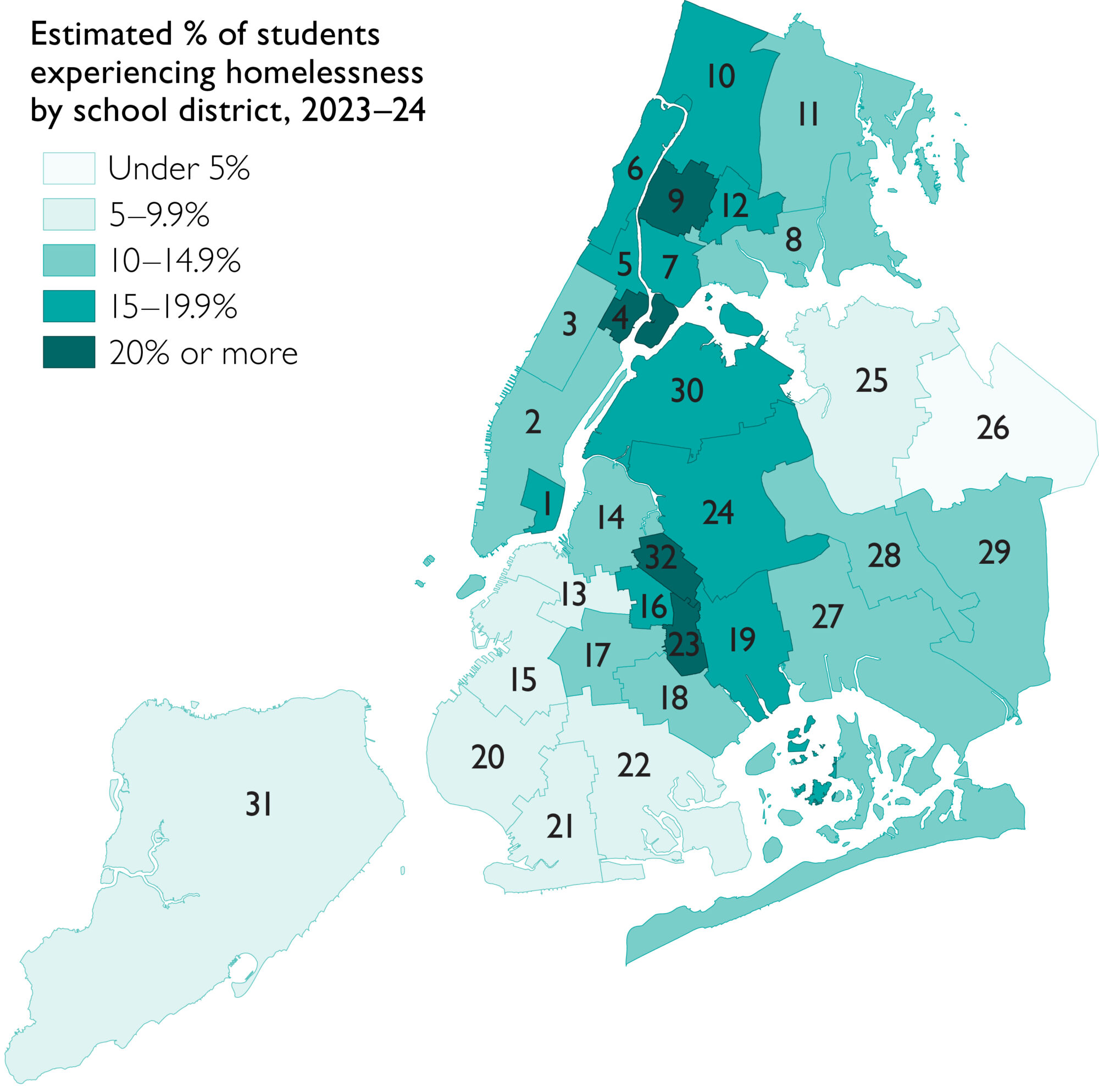Student Homelessness in New York City, 2023–24
More than 146,000 New York City students—about one in every eight children enrolled in the public schools—experienced homelessness during the 2023–24 school year, the ninth consecutive year in which more than 100,000 students were identified as homeless.

Data released today by Advocates for Children of New York (AFC) show that more than 146,000 New York City students—about one in every eight children enrolled in the public schools—experienced homelessness during the 2023–24 school year. Of these students, 54% were “doubled-up,” or temporarily sharing the housing of others because of a loss of housing or economic hardship, and 41% (more than 60,000 students) spent time in City shelters.
The new data, obtained from the New York State Education Department (NYSED) by AFC, show that the number of students in temporary housing rose last year, relative to 2022–23, in each of the City’s 32 community school districts. As in prior school years, students experiencing homelessness were particularly concentrated in upper Manhattan, the southwest Bronx, and parts of northeast and central Brooklyn; in both the Bronx and Manhattan, nearly one in six students did not have a permanent place to call home.

While last year saw a significant uptick in the number of students living in shelter, student homelessness is a longstanding challenge for New York City Public Schools (NYCPS). As described in the brief, 2023–24 was the ninth consecutive school year in which more than 100,000 students were identified as homeless—meaning that children who were in kindergarten the first year the City hit the ignominious 100,000 threshold have now started high school; the only school system they have ever known is one in which there are more students without a permanent place to call home than there are seats at Yankee Stadium and Citi Field combined.
Students who are homeless, and especially those in shelter, face tremendous obstacles to success in school. For example, in 2022–23 (the most recent year for which data are available):
- Half of all students in temporary housing and 67% of students in shelter were chronically absent, meaning they missed at least one out of every ten school days;
- The English Language Arts (ELA) proficiency rate for students in temporary housing in grades 3–8 was more than 20 percentage points lower than that for students in permanent housing; and
- Students living in shelter dropped out of high school at triple the rate of their permanently housed peers.
These significant disparities in academic outcomes, along with the continued increase in the number of students experiencing homelessness, underscore the longstanding need for increased funding to meet these students’ needs. New York State is currently reexamining the Foundation Aid formula, which determines how much per-pupil funding school districts receive from Albany and which has not been updated in over 15 years. Among other changes to the now-outdated formula, more than 115 organizations, the United Federation of Teachers (UFT), and NYCPS itself are all calling for the addition of a weight for students in temporary housing.
“Student homelessness has skyrocketed over the past decade, but right now, districts receive no additional per-pupil funding from the State to help meet the educational needs of students in temporary housing,” said Kim Sweet, Executive Director of Advocates for Children of New York.
“It’s critical that New York update the Foundation Aid formula to better support today’s students—including the roughly one in eight students in New York City who do not have a permanent place to call home.”
Kim Sweet, Executive Director of Advocates for Children of New York
“It is unconscionable that, year after year, tens of thousands of students in this City don’t have a permanent home,” said Jennifer Pringle, Director of AFC’s Learners in Temporary Housing Project. “While the City works to help families find permanent housing, it must also focus more attention on helping students succeed in school. School can be the key to breaking the cycle of homelessness, but so many children, especially those in shelters, continue to fall behind. The City should take steps such as addressing delays in arranging transportation, ensuring families are placed in shelters near their children’s schools, getting rid of 60-day shelter limits, and addressing staffing shortages.”
-
View the press release as a PDF
November 18, 2024
Media Coverage
-
1 in 8 N.Y.C. Public School Students Were Homeless Last Year
-
One in eight NYC students was homeless last year
-
1 in 8 NYC public school students were homeless last school year: report
-
1 in 8 NYC students experienced homelessness last year, a record high
-
1 in 8 NYC public school kids was homeless last school year
-
Number of homeless students in NYC schools hits record high, new data shows
-
With Starkest Increase in a Decade, More NYC Students Without Homes Than Ever
-
NYC schools have over 100,000 homeless students — for ninth year in a row

